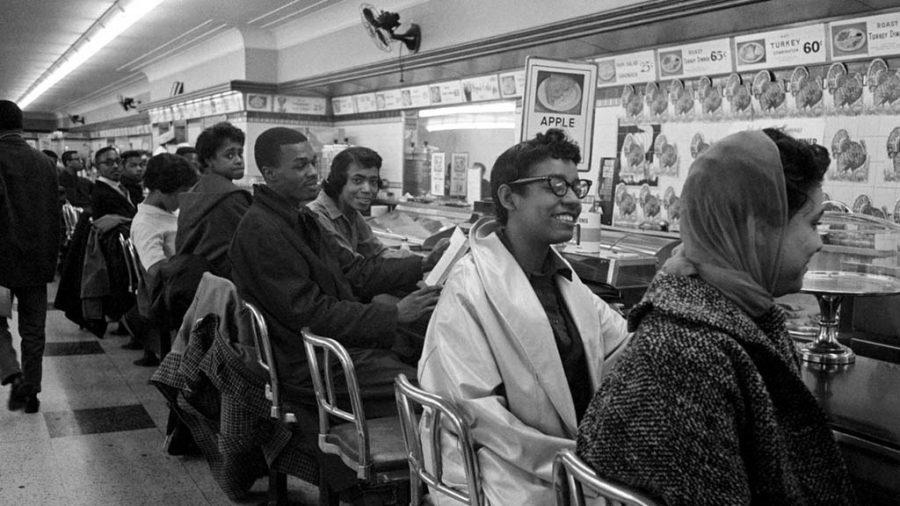Jefferson welcomes new elective: African American History
Photo courtesy of Library of Congress
After being refused service, African-American demonstrators occupied a lunch counter in Nashville, Tennessee during the year of 1960. “One thing I am really excited about is the opportunity for students to examine how African Americans are not a monolith group and that there is a lot of diversity within the ethnic group. Being able to look at areas of intersectionality can help us better understand how that particular ethnic group is diverse within itself along with how different perspectives and viewpoints vary,” assistant principal Cynthia Hawkins said.
January 19, 2021
In the next school year, Jefferson students will have the opportunity to enroll in a new humanities elective– African American History. Completely new to Fairfax County Public Schools, the course explores the perspective and experience of African Americans from pre-colonial Africa to modern day North America. The one year course will satisfy Jefferson’s Social Studies credit requirement. It will be open to any student in 9th through 12th grade.
“The course is going to begin in indigenous Africa, and will look at how Africans were captured, enslaved, and forcibly brought to what would become the United States. It will look at the way those enslaved persons helped to build our country and the experiences of those enslaved persons through their fight for emancipation in the Civil War. The course will analyze the conflicts of the Reconstruction Era, and follow through to the Civil Rights Era and up to the present issues African Americans are facing,” assistant principal Cynthia Hawkins said.
In addition, a deeper look at the African American experience throughout US history is taken through the course. In contrast to the broad overview that current American history classes provide, African American History is designed to zoom in on a specific ethnic group and explore their influence on the development of the United States.
“This is going to be a dedicated opportunity to look at how African Americans have influenced and been influenced by the story of Virginia and America. So, not just looking at a passive experience of African Americans in our history, but looking at an active experience and how they have actively helped to shape our nation,” Hawkins said.
Furthermore, the course surrounds an essential question: what is freedom? Throughout the African American History elective course, this question will arise frequently. The goal of this course is to generate civic engagement and informed action through compelling questions that stem from the key question of what freedom is.
“Looking at diverse perspectives and voices of how different groups have been impacted by events in history and how they have had an impact on those events are really important questions,” Hawkins said.
Although the course does not have an AP level distinction or a honors level distinction, this elective is prepared to take history lessons to the next level.
“It is a general level course, but we will be teaching in a rigorous way. There is a lot of flexibility for students to do independent research and inquiry into things that are interesting to them. So, that tends to lend to a pretty high level of rigor that doesn’t feel super rigorous, because it’s something that people are interested in,” Hawkins said.
Additionally, the African American History elective has a unique aspect that other humanities courses do not have– a required capstone project. The African American History capstone is an independent research project conducted by students regarding a question or problem.
“Students are going to pick a question or a problem that’s going to be related to the essential questions for the course and some understanding of African American History. Students are going to be able to do that research over the course of time,” Hawkins said. “There are other courses that will incorporate the capstone project, but it being a requirement of the state is unique to African American History.”
While explaining what the African American History capstone project is, Hawkins uses the freshman IBET project for comparison.
“When you think about the IBET project, you’ve got a project that you’re revisiting over the course of the year. By the time you get to the end of the year, you’re going to have something that will reflect what you’ve learned. The IBET project is somewhat of a capstone project,” Hawkins said.
Although the content of the course is unknown, many teachers are looking forward to seeing students learn the accurate story of America.
“I would love to teach this course, and we’ve got a lot of people who are really excited about this course,” Hawkins said.
Moreover, teachers and students alike are excited to see African American History on the course request selection website.
“African American history is something that I’ve wanted to learn more about. It was always something that was just briefly mentioned in my social studies classes. It was not really delved into much even though African American history is American history,” freshman Anya Dutta said. “I think it’s the course I’m most interested in taking.”






